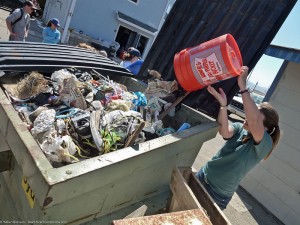
Katelyn Lamb, Content Editor
It was my freshman year of college in San Diego, California. I was taking an environmental ecology class and learning the “green” ways of my new SoCal community. One day, when walking to the grocery store with a friend, we were accosted by a well-meaning but ineffective Greenpeace representative. After his basic sermon failed to persuade me to join his ranks on that sunny sidewalk, he made a few judgements on my appearance (“You’re wearing overalls – you MUST want to join Greenpeace!”). Eventually, he became angry as we resisted his less than appealing offer to fight for the environment with such a combative peer. His parting words were “Go green, or else!”
While living in Oklahoma, chances are most of you have escaped the abrasive environmentalist. Still, you may have heard the phrase “go green” or people advocating for eco-friendly products or changes like better recycling. What I find to be often lacking in these noble and true encouragements, though, is pragmatism. Many people will gladly tell me I need to be more environmentally responsible. Few, though, will take the time and energy to explain how, to tell me what specifically I should and should not do in stewardship of creation.
Enter Bea Johnson, a Californian pioneer in the practicality of going green. Johnson, along with her husband and two sons, embarked on a mission to radically transform their lifestyles by living with less. The family’s goal is to create, you guessed it, zero waste. Nada. Zip. Zero waste means eliminating a lot of standard products that eventually become trash, like paper towels, trash can liners, styrofoam, plastic wrap and packaging. This approach also challenges the Johnsons to use products, like soaps or cleaning supplies, that do not create waste in their production and are not damaging to the environment. With that in mind, Bea makes her own tooth powder, body exfoliator (baking soda) and all purpose cleaner (vinegar, water and castile soap).
Bea summarizes her family’s perspective on life with the Five R’s: Refuse, Reduce, Reuse, Recycle and Rot. She is quick to emphasize that these strategies should be adhered to in that order. The Johnsons encourage people to refuse unnecessary consumption, believing that the American lifestyle is excessive and deceiving in its equation of more with happiness. They also advise consumers to buy, need and use less stuff, reducing their costs and impact on the environment. Reusing applies to almost everything in the Johnson’s house; if it cannot be reused, it doesn’t have a place in their home. Think metal water bottles and glass canisters of cereal. Recycling is also important for zero waste living. While the family attempts to keep and utilize everything they purchase, if they must retire an item, it is recycled and either made into something new by Bea and her crew or to a recycling company. Finally, rotting occurs with the family’s compost. For wet trash, such as food scraps, the Johnson’s keep a container outdoors. By placing live worms in the container, the garbage is processed into nutritious compost that the family uses for their garden.
The Johnson’s zero waste efforts have really paid off. Bea states that, since living this minimalist lifestyle, her and her family “are happier and lead more meaningful lives based on experiences instead of stuff, action instead of inaction.” She also notes that zero waste has been a time, energy and money saver for her and her husband, making it appealing, not only for the environmental wellness, but personal wellness as well.
You can check out Bea’s blog here http://zerowastehome.blogspot.com/, complete with reduction ideas, recipes, shopping tips and more! Living a zero waste life, or even a less waste life, is a practical alternative to the thoughtless consumption we are so accustomed to. Study up and the next time someone admonishes you to “go green,” you’ll be one step ahead of them.